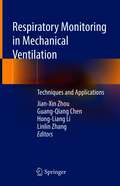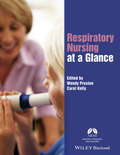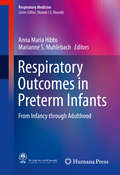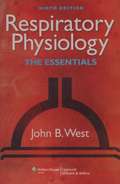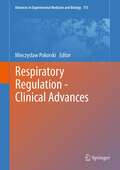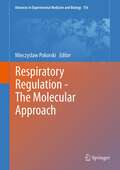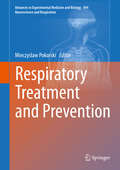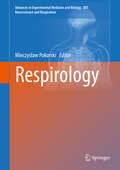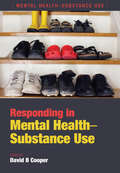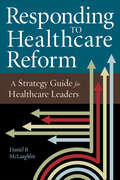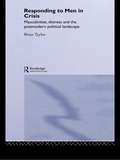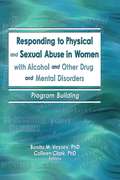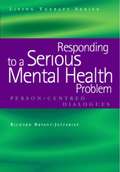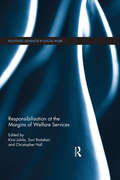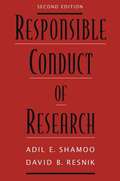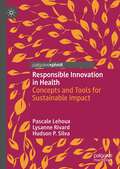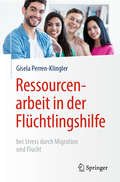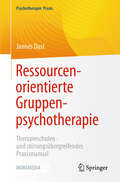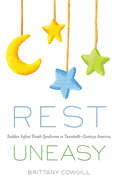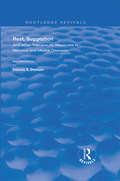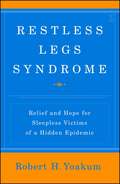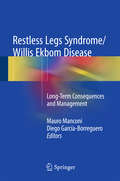- Table View
- List View
Respiratory Monitoring in Mechanical Ventilation: Techniques and Applications
by Jian-Xin Zhou Guang-Qiang Chen Hong-Liang Li Linlin ZhangThis book covers the up-to-date advancement of respiratory monitoring in ventilation support as well as detecting the physiological responses to therapeutic interventions to avoid complications. Mechanical ventilation nowadays remains the cornerstone in life saving in critically ill patients with and without respiratory failure. However, conclusive evidences show that mechanical ventilation can also cause lung damage, specifically, in terms of ventilator-induced lung injury.Respiratory monitoring encloses a series of physiological and pathophysiological measurements, from basic gas exchange and ventilator wave forms to more sophisticated diaphragm function and lung volume assessments. The progress of respiratory monitoring has always been accompanied by advances in technology. However, how to properly conduct the procedures and correctly interpret the data requires clear definition.The book introduces respiratory monitoring techniques and data analysis, including gas exchange, respiratory mechanics, thoracic imaging, lung volume measurement, and extra-vascular lung water measurement in the initial part. How to interpret the acquired and derived parameters and to illustrate their clinical applications is presented thoroughly. In the following part, the applications of respiratory monitoring in specific diseases and conditions is introduced, including acute respiratory distress syndrome, obstructive pulmonary diseases, patient-ventilator asynchrony, non-invasive ventilation, brain injury with increased intracranial pressure, ventilator-induced diaphragm dysfunction, and weaning from mechanical ventilation.This book is intended primarily for ICU physicians and other practitioners including respiratory therapists, ICU nurses and trainees who come into contact with patients under mechanical ventilation. This book also provides guidance for clinical researchers who take part in respiratory and mechanical ventilation researches.
Respiratory Nursing at a Glance
by Carol Kelly Wendy PrestonA concise, highly visual and comprehensive guide to respiratory nursing care, in collaboration with the Association of Respiratory Nurses (ARNS). Takes a unique, holistic approach to care across the life course, including childhood development of the respiratory system, communication and end-of-life care. Provides evidence-based information in a quick reference format. Ideal for nurses and health care students and practitioners at all levels involved in respiratory care requiring a highly visual, evidence-based, quick-reference book.
Respiratory Outcomes in Preterm Infants
by Anna Maria Hibbs Marianne S. MuhlebachThis book presents pulmonary outcomes of prematurity, from their emergence in infancy through to their consequences in adulthood. With an increasing number of preterm births and more infants surviving, there is now a larger population of adults with lung disease originating in infancy requiring specialized care. Looking at the whole group of preterm infants, not just those with bronchopulmonary dysplasia, this text covers a wide spectrum of pulmonary outcomes, including: pulmonary hypertension, wheezing, and alterations in sleep. The chapter authors focus on critically appraising what is and is not known about each outcome and suggest key questions that still need to be answered. Respiratory Outcomes in Preterm Infants: Sequelae from Infancy through Adulthood is an ideal reference for the multidisciplinary group that cares for these preterm infants and the adults they become, including: neonatologists, pediatric pulmonologists, pediatricians, adult pulmonologists, primary care physicians, nurses, and fellows.
Respiratory Physiology: The Essentials 9th Edition
by John B. WestWidely considered the gold standard for the teaching and learning of respiratory physiology, this fully updated Ninth Edition includes key points for each chapter and multiple-choice review questions and answers with full explanations.
Respiratory Regulation - Clinical Advances
by Mieczyslaw PokorskiThis book, written for pulmonary and family doctors, general practitioners, allergologists, and neuropsychologists, presents cutting-edge clinical research and therapy-oriented knowledge in the field of respiratory medicine. Clinical knowledge is undergoing dramatic improvement. Respiration is one such prominent field. A better understanding of the pathogenesis of respiratory ailments and the regulation of lung ventilation is essential for advances in pharmacotherapy and the patient's quality of life. The book discusses a wide scope of topics, notably, innovations in detection and management of chronic inflammatory conditions such as COPD or asthma, acute infections of the respiratory tract, airway allergies and hyper-responsiveness, lung cancer, interstitial lung diseases, pulmonary function in health, disease and aging, sleep disordered breathing, interaction between the respiratory system and other bodily functions, and psychosomatic aspects of disease. After all, respiration is generated and integrated by the brain; therefore brain function is influential in respiratory regulation. The book is a platform that fosters the exchange of new clinical data between clinicians and academic neuroscientists, bringing a unique blend of medical diagnosis and practice to the leadership in respiratory medicine.
Respiratory Regulation - The Molecular Approach
by Mieczyslaw PokorskiThis book, an international collaborative effort in the area of molecular respiratory research, showcases a broad range of multidisciplinary approaches to unravel and analyze the underlying mechanisms of a spectrum of respiratory ailments. It discusses immunological and genetic respiratory disorders, cancer, respiratory allergies and cough, sleep disordered breathing and many others. Exciting new results and up-to-date critical overviews of widely debated topics pertaining to respiratory disorders are presented. The contributions provide evidence for the growing interest of the international community of researchers in the field of respiration. The book incorporates modern molecular approaches to diagnostic and treatment solutions, underscoring the need for rational, evidence-based treatment methods. Combining cutting edge basic and clinical research with expert knowledge and experience this book is essential reading for medical students, research scientists and practicing specialists in pulmonology, immunology and allergology.
Respiratory Treatment and Prevention
by Mieczyslaw PokorskiThe goal of this book is to further insight into the challenges related to respiratory health. Medical experts present their lines of scientific investigations on how to contain the disease, care for patients, and use preventive measures, with a focus on pulmonary-related disorders. Progress in the diagnostics and treatment of major infectious diseases affecting humanity such as tuberculosis, malaria, fungal and viral contagions is tackled. Other chapters provide some background information on the mechanisms and prevention of non-communicable diseases. New aspects of the etiology of sarcoidosis, air pollution-related lung cancer, and sleep disordered breathing are presented. Preventive measures of health in general and respiratory health in particular cannot do without a reminder of cigarette smoke avoidance and the respiratory aftermath of the smoking habit. The book presents scientific evidence-based practice knowledge. It is intended for healthcare professionals, specifically pulmonary specialists, primary care physicians, and all scientifically-minded individuals involved in the care of patients.
Respiratory Virology and Immunogenicity
by Mieczyslaw PokorskiThis volume provides a modern look on the age-old influenza infection and the preventive role of anti-influenza shots. Influenza pandemic outbreaks are unrelenting despite the growing understanding of the molecular basis of viral infection and its spreads. A leap in medical technologies has revolutionized the design of new influenza vaccines. The chapters cover vaccination strategies in various age-groups of people and provide the extensive amount of knowledge on the immune response to influenza vaccination in a spectrum of disease conditions.
Respirology
by Mieczyslaw PokorskiThe book addresses functional changes associated with or resulting from pulmonary diseases. Population-based clinical, epidemiological, and multicenter investigations are presented to provide a comprehensive update on prevalent respiratory problems; the exemplars are respiratory tract infections, tobacco abuse, chronic obstructive lung diseases, or socio-economic influence on morbidity. Novel issues related to the function of the carotid body, an organ generating hypoxic hyperventilation also are tackled. Significant insights into a wide range of related conditions are provided. Chapters are relevant to the broad readership as they examine health care quality, effectiveness of therapeutic strategies, the patient quality of life, and other relevant health issues. The authors present late-breaking knowledge and aim at thought-stimulating viewpoints on timely clinical topics in respiratory medicine.
Responding in Mental Health-Substance Use (Radcliffe Ser.)
by David B. CooperMental health-substance use is a complex interrelation, with equally complex implications for individuals and their families, health professionals and society. Although its international recognition as an issue of critical importance is growing, clear guidance for professionals on mental health-substance use and its treatment is hard to find. The Mental Health-Substance Use series addresses this need, concentrating on concerns, dilemmas and concepts that impact on the life and well-being of affected individuals and those close to them, and the future direction of practice, education, research, services, interventions, and treatment. Having outlined the field and service development in previous books, the third book in the series explores how professionals can best respond to the particular concerns and dilemmas arising from and in mental health-substance use for individuals and their families. It aims to inform, develop and educate these responses by sharing knowledge and enhancing expertise in this fast-developing field by exploring the interrelated psychological, physical, social, legal and spiritual experiences. The volumes in this series are designed to challenge concepts and stimulate debate, exploring all aspects of the development in treatment, intervention and care responses, and the adoption of research-led best practice. They are essential reading for mental health and substance use professionals, students and educators.
Responding to Emergencies Comprehensive First Aid CPR AED Textbook
by The American National Red CrossDesigned specifically for the academic market, this textbook facilitates learning and understanding of the knowledge and skills required to effectively respond to emergency situations. Updated with the latest science in first aid and emergency cardiovascular care, the revised 2012 edition of First Aid-Responding to Emergencies covers first aid as a stand-alone course, with the option to combine it with either Child CPR/AED or Adult study questions that can help you remember the skills needed to make a difference in any emergency situation.
Responding to Healthcare Reform: A Strategy Guide For Healthcare Leaders (ACHE Management)
by Daniel McLaughlinAll laws are modified by future legislatures, and the Affordable Care Act (ACA) will not be an exception. Healthcare organizations must be prepared to respond as the law evolves. Responding to Healthcare Reform clarifies the complexities of the ACA by explaining the underlying theories that shaped it, describing the act’s impact on the role of the healthcare organization, and offering direction for strategy formulation. Written for healthcare executives, it focuses on the sections of the bill that are most pertinent to provider operations. Because the ACA creates an uncertain environment, this book is stocked with a variety of tools to help healthcare executives predict change and recalibrate strategies. You will benefit from: Practical analysis of key aspects of the bill and how they will impact providers Descriptions of 20 possible scenarios that can be used to test the viability of strategies under various conditions
Responding to Men in Crisis: Masculinities, Distress And The Postmodern Political Landscape
by Brian TaylorResponding to Men in Crisis is based on new research looking at gendered assumptions about rationality and men's mental health. It looks at postmodern theory in relation to masculinities and madness, and discusses key contemporary debates in political uses of risk, dangerousness and so on. The author relates this to a discussion of current policy and practice responses to men within the mental health system. It offers the reader a theoretical exploration of a topically and politically sensitive issues and is relevant to service user involvement and survivor movements, making it essential reading for academics and students of sociology and allied disciplines.
Responding to Physical and Sexual Abuse in Women with Alcohol and Other Drug and Mental Disorders: Program Building
by Bonita Veysey Colleen ClarkLearn from the experiences of these program sites to develop better services for women with co-occurring disorders and histories of violenceThis book explores the efforts of the Women, Co-Occurring Disorders and Violence Study to address the significant lack of appropriate services for women trauma survivors with co-occurring mental health and substance use disorders. Experts describe the services integration programs of nine participating sites that address the multiple needs of these women. In this guide, you will find useful strategies for integrating services that are responsive to the strengths and needs of the individual as well as the community.This vital resource examines how-over a period of five years-sites designed, implemented, and evaluated their interventions. You will learn how sites developed their strategies for integrating services at both the clinical/individual level and at the services or systems level. The book also shows how trauma-informed, gender-specific, culturally competent care fosters treatment that is sensitive to related issues such as children and parenting, interpreting culture cues, and socioeconomic difficulties. In Responding to Physical and Sexual Abuse in Women with Alcohol and Other Drug and Mental Disorders, you will learn about the details of nine different programs, including: Franklin County Women&’s Research Project-a collaborative project for rural women, designed and operated by local consumer/survivor/recovering women (CSRs) The Triad Women&’s Project-a semi-rural comprehensive system of care to respond to the needs of women and children The Women Embracing Life and Living (WELL) Project-interventions include trauma, parenting, systems integration and mutual help groups withIntegrated Care Facilitators providing resource coordination and advocacyservices PROTOTYPES, Centers for Innovation in Health, Mental Health, and Social Services-the three levels of integration the Systems Change Center implemented the Boston Health Commission-an integrated model of trauma-informed services culturally and linguistically appropriate for its service population of primarily poor Latina and African American women Palladia&’s Portal Project-a comprehensive trauma-informed intervention designed to put trauma and safety first to assist women remaining in treatment Arapahoe House&’s New Directions for Families-a family-oriented intervention for women and their dependent children Allies-comprehensive, integrated services for women as well as intervention for their children, ages 5-10The District of Columbia Trauma Collaboration Study (DCTCS)-a two-phase project addressing the needs of dually diagnosed women trauma survivors Responding to Physical and Sexual Abuse in Women with Alcohol and Other Drug and Mental Disorders provides you with first-hand accounts of the process by which programs and service systems were transformed. As challenges were met and strategy was adapted to "real world" situations, the sites discussed in this text found new and improved methods for helping this unique group of women. The book offers tips, solutions, and possibilities to mental health professionals, substance abuse professionals, and domestic violence professionals, and even patients and/or clients searching for support.
Responding to a Serious Mental Health Problem: Person-Centred Dialogues (Living Therapies Series)
by Richard Bryant-JefferiesThis book uses narrative to describe powerfully what is happening, interspersed with the counsellor’s thoughts and reflections. Sessions of supervision are also described and linked to what is occurring in the therapy. The first part of the book focuses on a client struggling to cope with her son who has mental health and drug problems. The second part describes the son’s experience of entering into a therapeutic encounter after having reached a crisis point. Cultural differences are also explored. Included in this volume is material to inform the training process of counsellors and many others who seek to work with people experiencing these relational dynamics. It is intended as much for experienced counsellors as it is for trainees. It provides real insight into what can occur during counselling sessions. The book will also be of value to the many healthcare and social care professionals who, whilst they may specialise in other areas, will find that the issues dealt with in this volume have impact on the work they are doing. For them, the text demystifies what can occur in therapy, and provides useful ways of working that may be used by professionals other than counsellors. Potential clients will also gain an insight into the process.
Responsibilisation at the Margins of Welfare Services (Routledge Advances in Social Work)
by Kirsi Juhila Suvi Raitakari Christopher HallThe impetus for this book is the shift in welfare policy in Western Europe from state responsibilities to individual and community responsibilities. The book examines the ways in which policies associated with advanced liberalism and New Public Management can be identified as influencing professional practices to promote personalisation, participation, empowerment, recovery and resilience. In examining the concept of ‘responsibilisation’ from the point of view of both the ‘responsibilised client and welfare worker’, the book breaks from the traditional literature to demonstrate how responsibilities are negotiated during multi-professional care planning meetings, home visits, staff meetings, focus groups and interviews with different stakeholders. The settings examined in the book can be described as on the ‘margins of welfare’ - mental health, substance abuse, homelessness services and probation work, where the rights and responsibilities of clients and workers are uncertain and constantly under review. Each chapter approaches the management of responsibilities from a particular angle by combining responsibilisation theory and discourse analysis to examine everyday encounters. Taken together, the chapters paint a comprehensive picture of the responsibilisation practices at the margins of welfare services and provide an extensive discussion of the implications for policy and practice. Drawing upon both the governmentality literature and everyday encounters, the book provides a broad approach to a key topic. It will therefore be a valuable resource for social policy, public administration, social work and human service researchers and students, and social and health care professionals.
Responsible Conduct of Research (2nd edition)
by David B. Resnik Adil E. ShamooResponsible Conduct of Research provides an introduction to many of the social, ethical, and legal issues facing scientists today. The fully updated volume includes three brand new chapters and additional cases for discussion, as well as analysis of the latest issues and problems in research ethics. Featuring chapters that treat such topics as ethical decision-making, research misconduct, and intellectual property, this new edition will be an indispensable resource for students and teachers, academics and industry professionals alike.
Responsible Innovation in Health: Concepts and Tools for Sustainable Impact
by Pascale Lehoux Lysanne Rivard Hudson P. SilvaThis book introduces the field of Responsible Innovation in Health (RIH) by clarifying its theoretical foundations and the practical approaches that enable the design and production of responsible medical devices, health and social care interventions, digital tools and solutions based on artificial intelligence. It brings a lasting impact on the ways innovation stakeholders think about and develop solutions to twenty-first century challenges, including the Sustainable Development Goals (SDGs).
Ressourcenarbeit in der Flüchtlingshilfe: bei Stress durch Migration und Flucht
by Gisela Perren-KlinglerErzwungene Migration und Flucht bedeuten oft eine große Verunsicherung oder sogar Traumatisierung der Betroffenen. Nach Ankunft im Gastland gilt es, die disruptiven Erfahrungen zu bewältigen, um eine gute Integration und möglichst selbständiges Leben aufbauen oder nach Rückkehr ins Heimatland an das frühere Leben anknüpfen zu können. Die hier dargestellten Vorgehensweisen basieren auf der Grundannahme, dass Menschen über ausreichende Ressourcen verfügen, um auch nach potenziell traumatischen Erlebnissen gut weiterzuleben und zu wachsen; es gilt, diese spezifischen Ressourcen wiederzuentdecken, zu nutzen und zu stärken. Das Buch bietet einfach aufbereitetes Grundlagenwissen rund um die Themen exzessiver Stress und seine Konsequenzen, Trauma und Verlusterlebnisse. Zahlreiche einfache Strategien und Techniken werden aufgezeigt, wie betroffene Menschen unter Anleitung Ressourcen aktivieren können, um diese Herausforderungen zu meistern. Das Buch richtet sich an alle Berufsgruppen, die im psychosozialen Dienst in der Flüchtlingshilfe aktiv sind. Es kann sogar dazu benützt werden, um mit Flüchtlingen zusammen eine Ausbildung als Mediatoren und Mediatorinnen für ihre Landsleute in die Wege zu leiten.
Ressourcenorientierte Gruppenpsychotherapie: Therapieschulen- und störungsübergreifendes Praxismanual (Psychotherapie: Praxis)
by Jannes DustDieses Buch soll Ihnen im Rahmen einer Kompetenzorientierung alles an die Hand geben, was Sie für die Leitung einer ressourcenorientierten Gruppenpsychotherapie in der ambulanten und/oder stationären Behandlung brauchen. Anhand von konkreten Praxisanleitungen, zahlreichen Beispielen und übersichtlichem Arbeitsmaterial unterstützt Sie dieses Manual von der Vorbereitung über die Durchführung bis zur letzten Gruppensitzung. Es soll Ihnen Unsicherheiten nehmen, Sie auf schwierige Situationen in der Gruppe vorbereiten und Sie in der Findung Ihrer therapeutischen Haltung stärken. Aus dem Inhalt: Selbstheilungskräfte – Selbstfürsorge – Versorgung von Bedürfnissen – Ressourcenaktivierung – Selbstwertgefühl und Selbstwirksamkeit. Über den Autor:Jannes Dust, M.Sc. Psychologe, Psychologischer Psychotherapeut. Erfahrung in unterschiedlichen psychiatrischen Einrichtungen, mit Schwerpunkt Gruppenpsychotherapie. Niedergelassen in eigener Praxis in Bonn. Arbeitsschwerpunkte: Ressourcenorientierte Therapie, Gruppenpsychotherapie, Verhaltenstherapie, Strukturpathologie, Abhängigkeitserkrankungen und außergewöhnliche Erfahrungen.
Rest Is Resistance: A Manifesto
by Tricia Hersey***INSTANT NEW YORK TIMES BESTSELLER***Disrupt and push back against capitalism and white supremacy. In this book, Tricia Hersey, aka The Nap Bishop, encourages us to connect to the liberating power of rest, daydreaming, and naps as a foundation for healing and justice. What would it be like to live in a well-rested world? Far too many of us have claimed productivity as the cornerstone of success. Brainwashed by capitalism, we subject our bodies and minds to work at an unrealistic, damaging, and machine‑level pace –– feeding into the same engine that enslaved millions into brutal labor for its own relentless benefit. In Rest Is Resistance, Tricia Hersey, aka the Nap Bishop, casts an illuminating light on our troubled relationship with rest and how to imagine and dream our way to a future where rest is exalted. Our worth does not reside in how much we produce, especially not for a system that exploits and dehumanizes us. Rest, in its simplest form, becomes an act of resistance and a reclaiming of power because it asserts our most basic humanity. We are enough. The systems cannot have us.Rest Is Resistance is rooted in spiritual energy and centered in Black liberation, womanism, somatics, and Afrofuturism. With captivating storytelling and practical advice, all delivered in Hersey&’s lyrical voice and informed by her deep experience in theology, activism, and performance art, Rest Is Resistance is a call to action, a battle cry, a field guide, and a manifesto for all of us who are sleep deprived, searching for justice, and longing to be liberated from the oppressive grip of Grind Culture.
Rest Uneasy: Sudden Infant Death Syndrome in Twentieth-Century America (Critical Issues in Health and Medicine)
by Brittany CowgillTracing the Sudden Infant Death Syndrome (SIDS) diagnosis from its mid-century origins through the late 1900s, Rest Uneasy investigates the processes by which SIDS became both a discrete medical enigma and a source of social anxiety construed differently over time and according to varying perspectives. American medicine reinterpreted and reconceived of the problem of sudden infant death multiple times over the course of the twentieth century. Its various approaches linked sudden infant deaths to all kinds of different causes—biological, anatomical, environmental, and social. In the context of a nation increasingly skeptical, yet increasingly expectant, of medicine, Americans struggled to cope with the paradoxes of sudden infant death; they worked to admit their powerlessness to prevent SIDS even while they tried to overcome it. Brittany Cowgill chronicles and assesses Americans’ fraught but consequential efforts to explain and conquer SIDS, illuminating how and why SIDS has continued to cast a shadow over doctors and parents.
Rest, Suggestion, and Other Therapeutic Measures in Nervous and Mental Diseases (Routledge Revivals)
by Francis Xavier DercumFirst published in 1919. Emphasis has been laid upon simple physiologic methods of treatment; such as rest, feeding and psychotherapy. In order that the principles underlying the application of these methods should be clearly appreciated, the author has unfolded, in as systematic a manner as possible, the problems presented by the exercise of function, rest and the various fatigue states. He has adopted a purely clinical interpretation of the neuroses, a clear comprehension of which is an indispensable preliminary to intelligent and successful treatment. In embracing physiologic methods, medicines and psychotherapy in one volume, the author has endeavoured to present a comprehensive discussion of the treatment of nervous and metnal disorders; especially of those which are functional in character.
Restless Legs Syndrome
by Robert YoakumWithin these pages is the promise of a long-awaited good night's rest. For decades, millions of people have experienced the irresistible urge to move their legs without understanding why. These disagreeable leg sensations get worse with inactivity, making sitting still and sleep painful and sometimes impossible. If you hold this book, you or someone you love has most likely lived with this constant discomfort, this agitated inability to rest -- restless legs syndrome. You are not alone. According to the American Medical Association, 10 to 15 percent of adult Americans have the neurological disorder known as restless legs syndrome. This underdiagnosed and treatable condition can completely overwhelm a person's life, causing stress, sleep deprivation, career difficulties, and relationship strife. Author Robert Yoakum has suffered from restless legs syndrome all of his adult life. In Restless Legs Syndrome, he has compiled a comprehensive resource on this disease, giving those afflicted with it a voice and creating a community. In addition, many of the foremost medical specialists in the field have contributed their knowledge and experience to make this the most comprehensive and timely source of information on this disease. Restless Legs Syndrome provides invaluable information for victims, their friends and loved ones, and health-care providers. Yoakum informs and advises readers on: Sleep management and alternative rest options How to enlist help from others Possible causes of restless legs syndrome Criteria for diagnosis Medical advice and treatment options The relationship of stress, dopamine, and iron Finding or creating a restless legs syndrome support group Yoakum combines empathy and understanding with practical, clear-cut information, and helpful stories from others who share their tales of relief and hope.
Restless Legs Syndrome/Willis Ekbom Disease
by Mauro Manconi Diego García-BorregueroDue to the fact that Restless Legs Syndrome/Willis-Ekbom Disease is usually a chronic condition, this book aims to provide physicians with the necessary tools for the long-term management of patients with RLS. The first part of the book addresses the various comorbidities and long-term consequences of RLS on life quality, sleep, cognitive, psychiatric and cardiovascular systems, while the second part focuses on the management of long-term treatment and the drug-induced complications in primary RLS and in special populations. Written by experts in the field, this practical resource offers a high-quality, long-term management of RLS for neurologists, sleep clinicians, pulmonologists and other healthcare professionals.
